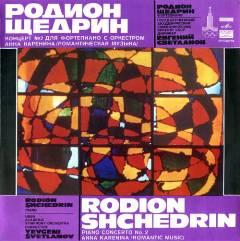Rodion Shchedrin – Piano Concerto No.2 – Anna Karenina (1975)
Rodion Shchedrin – Piano Concerto No.2 – Anna Karenina (1975)

Concerto No.2 for Piano and Orchestra 1. Dialogs. Tempo rubato 2. Improvisaton. Allegro 3. Contrasts. Andante Anna Karenina - Romantic Music for Large Symphony Orchestra 4. Anna Karenina - Bad omen - Anna’s love - Anna’s lies - Anna’s rebellion - Anna’s dreams - Anna’s death Rodion Schedrin - piano USSR Academic Symphony Orchestra Yevgeni Svetlanov - conductor
In Piano Concerto #2 (1966), Shchedrin turns chameleon. No longer a sentimentalist, he peppers the meal with dissonance. Mixing twelve-tone compositional techniques with traditional ones (like recapitulation and development), this piece dives and thrashes about, never losing its backbone of Shchedrin showmanship. Don't play it before going to sleep. The piano shakes the orchestra as if trying to wake it up. The orchestra snarls and squirms and – it's all great fun. In the final movement, Shchedrin seems to imitate Shostakovich during the Andante and inserts a jazzy, American-style xylophone passage during the Allegro. --- classical.net
Since Prokofiev's Romeo and Juliet, the authors of ballets, particularly in Russia, have not been afraid to translate great literary subjects into dance. Tolstoy's novel is another story of forbidden and doomed love: the married Anna loses everything because of her adulterous love in this tragic classic. Shchedrin, a fine composer, became a composer of ballets because of his marriage to Maya Plisetskaya, a prima ballerina for the Bolshoi. This sweeping, romantic score was written for her to portray the most touching heroine in all of Russian literature. The music darkens and becomes more dissonantly oppressive as Anna becomes more and more hopelessly trapped by her situation. It ends starkly with a tour de force of orchestration, as Shchedrin manages the most naturalistic and authentic-sounding railroad engine imitation in all of music: This train strikes Anna with a sound of almost brutal ugliness, and the train sounds recede with an indifferent mechanical soullessness which reflects how Anna has been abandoned by society. This is excellent score, in a style best described as "post-Prokofiev"; its 1972 premiere in Moscow was one of the grand musical events of the later Soviet era. There are also echoes of Tchaikovsky, the preeminent Russian ballet composer. "Although I borrowed some elements from the music of Tchaikovsky," Shchedrin has stated, "it was never my intention to fully retain its style or resort to a mere compilation. The subject of the novel, its essence and heart of the conflict are understandable to our contemporaries. What I undertook, therefore, was to synthesize the external characteristics of the times -- the costumes, manners and intonations -- with a modern viewpoint of Tolstoy's novel." --- Joseph Stevenson, Rovi
download (mp3 @320 kbs):
yandex 4shared mediafire zalivalka cloudmailru uplea








